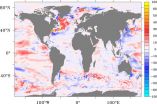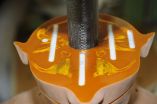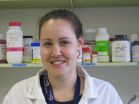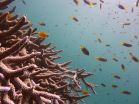Brain research reveals new hope for patients with anorexia nervosa
Dresdner neuroimaging study of anorexia nervosa uncovers a positive side effect of weight restoration therapy: Brain shrinkage is reversible
2014-12-03
(Press-News.org) Their novel findings obtained by measuring "cortical thickness" for the first time in the eating disorder are now published in the renowned journal "Biological Psychiatry". The authors conclude, "The global thinning of cortical gray matter observed in acutely ill adolescent patients can be completely reversed following successful weight rehabilitation therapy". Previous studies of changes in brain structure associated with anorexia nervosa were limited in their ability to clarify important questions regarding the regional specificity and persistence of anomalies following therapy. In contrast, the analysis strategies employed by the Dresdener scientists in their large sample of both acutely ill and long-term recovered patients allowed for precise measurement of cortical gray matter on a sub-millimeter scale at over 100,000 locations across the entire surface of the brain. Prof. Stefan Ehrlich explained, "Not only the spatial expanse but also the magnitude of cortical gray matter thinning in acute anorexia nervosa is noteworthy - comparable to that typically observed in Alzheimer's disease."
Study participants underwent MRI scanning immediately following admission to specialized eating disorder clinics at the Dresdener University Hospital and following successful therapy with complete restoration of normal weight, eating behavior and menstruation. Roughly half of the patients that receive treatment successfully maintain these criteria - it is an extremely long road to long-term recovery for those afflicted with anorexia nervosa.
"We observed complete normalization of cortical gray matter thickness in the long-term weight rehabilitated patients in our sample", exclaimed Prof. Ehrlich, "which is a particularly encouraging finding for those suffering from the disorder." However, while this study shows that changes in brain structure can improve with therapy, anorexia nervosa may have other serious long-term consequences that are not reversible, such as reduction of bone mass due to osteoporosis.
INFORMATION:
FOCUS-Ranking TOP-Physicians 2014
The German news magazine „Focus" publishes highly-influential ranking lists of experts from various fields of medicine based on data independently collected from e.g. medical specialist societies, recommendations from clinic directors, patient and self-help groups. In 2014, the Focus-Ranking declared Prof. Stefan Ehrlich „Top-Physician" in the field of eating disorders.
A major focus of the Department of Child and Adolescent Psychiatry and Psychotherapy of the University Hospital Carl Gustav Carus at the TU Dresden is the treatment of eating disorders. Drawn by this expertise, patients come from every corner of Germany to receive state-of-the-art therapy. Among the services provided at the „ Eating Disorders Treatment and Research Center" include a specialized inpatient unit, outpatient clinic and a family day clinic.
Publication:
Joseph A. King, Daniel Geisler, Franziska Ritschel, Ilka Schober, Maria Seidel, Benjamin Roschinski, Laura Soltwedel, Johannes Zwipp, Gerit Pfuhl, PhD, Michael Marxen, PhD, Veit Roessner, MD, Stefan Ehrlich, MD: Global Cortical Thinning in Acute Anorexia Nervosa Normalizes Following Long-Term Weight Restoration; in: Biological Psychiatry, DOI: http://dx.doi.org/10.1016/j.biopsych.2014.09.005
Contact:
TU Dresden & University Hospital Carl Gustav Carus Dresden
Eating Disorders Treatment and Research Center
Department of Child and Adolescent Psychiatry and Psychotherapy
Prof. Stefan Ehrlich
Tel. +49 (0)351 458-2244
Fax +49 (0)351 458-5754
E-Mail: stefan.ehrlich@uniklinikum-dresden.de
http://www.uniklinikum-dresden.de
http://www.kjp-dresden.de
[Attachments] See images for this press release:

ELSE PRESS RELEASES FROM THIS DATE:
2014-12-03
The Ebola epidemic in West Africa has pushed the decades-long search for a treatment to a frenetic pace. Somewhere in the virus' deceptively simple structure is a key to taming it. To find that key, scientists are undertaking multiple strategies, some of which are being fast-tracked for human testing, according to an article in Chemical & Engineering News (C&EN), the weekly newsmagazine of the American Chemical Society.
Senior editors Lisa M. Jarvis and Bethany Halford of C&EN note that the Ebola virus is endowed with a mere seven genes that code for eight proteins. Although ...
2014-12-03
New research shows that ocean heat uptake across three oceans is the likely cause of the 'warming hiatus' - the current decade-long slowdown in global surface warming.
Using data from a range of state-of-the-art ocean and atmosphere models, the research shows that the increased oceanic heat drawdown in the equatorial Pacific, North Atlantic and Southern Ocean basins has played a significant role in the hiatus.
The new analysis has been published in Geophysical Research Letters by Professor Sybren Drijfhout from the University of Southampton and collaborators from ...
2014-12-03
This news release is available in German.
The new study establishes that the best combination for incentives and punishment that promotes cooperation are in the form of "First carrot, then stick". The mathematical proof shows how the combined sequential use of reward ("carrot") and punishment ("stick") promotes cooperation in collaborative endeavors, such as protecting social commons and maintaining mutual aid.
Rewards and punishments are the most tried and true approaches when trying to promote cooperation in collaborative endeavors. New research, in terms of ...
2014-12-03
Analysis of data from the MATROSHKA experiment, the first comprehensive measurements of long-term exposure of astronauts to cosmic radiation, has now been completed. This experiment, carried out on board and outside of the International Space Station, showed that the cosmos may be less hostile to space travellers than expected.
Among the many life-threatening hazards to the space traveller, cosmic radiation is a major one, considerably limiting the time astronauts may spend in space without incurring excessive risk to their health from too high a dose of this ionizing ...
2014-12-03
An Australian National University (ANU) mathematician has developed a new way to uncover simple patterns that might underlie apparently complex systems, such as clouds, cracks in materials or the movement of the stockmarket.
The method, named fractal Fourier analysis, is based on new branch of mathematics called fractal geometry.
The method could help scientists better understand the complicated signals that the body gives out, such as nerve impulses or brain waves.
"It opens up a whole new way of analysing signals," said Professor Michael Barnsley, who presented ...
2014-12-03
INDIANAPOLIS, December 2, 2014 -- Today, Eli Lilly and Company announced results from new analyses of two Phase 3 trials evaluating the relationship between cognitive and functional treatment effects in patients with mild Alzheimer's disease. Based on post-hoc analyses of the Phase 3 trials, the findings suggested that cognitive deficits were more apparent than functional deficits in mild Alzheimer's disease when measured with the Alzheimer's disease Assessment Scale-Cognitive (ADAS-Cog) and the Alzheimer's disease Cooperative Study-Activities of Daily Living (ADCS-ADL) ...
2014-12-03
Amsterdam, The Netherlands, December 2, 2014 - Detection, prevention, and preclinical treatment are three key areas that may make a difference in the battle to reduce the rapid rise of new Alzheimer's disease (AD) cases every year. These three topics are the focus of an important new supplement to the Journal of Alzheimer's Disease.
Organized by Guest Editor Jack de la Torre, MD, PhD, Professor of Neuropsychology at The University of Texas at Austin, the supplement is a novel guide to how Alzheimer dementia may be approached and managed right now, not years from now. ...
2014-12-03
Scientists have released details of a raft of new chemicals with potent anti-malarial properties which could open the way to new drugs to fight the disease.
A new paper in PNAS is the third published by the group at the Australian National University (ANU), which has collaborated with groups from around the globe to uncover potential ammunition in the fight against malaria.
Over 200 million people contract malaria each year, and the parasite that causes the disease has become resistant to most of the drugs currently available.
"The papers show the malaria parasite ...
2014-12-03
A glimmer of hope for corals as baby reef builders cope with acidifying oceans
While the threat of coral bleaching as a result of climate change poses a serious risk to the future of coral reefs worldwide, new research has found that some baby corals may be able to cope with the negative effects of ocean acidification.
Ocean acidification, which is a direct consequence of increased atmospheric carbon dioxide levels, is expected to have a deleterious effect on many marine species over the next century.
An international team examining the impact of ocean acidification ...
2014-12-03
Coral reefs provide a range of benefits, such as food, opportunities for income and education, but not everyone has the same access to them, according to a new study conducted by the ARC Centre of Excellence for Coral Reef Studies (Coral CoE) at James Cook University.
The researchers examined how people from 28 fishing communities in Madagascar, Kenya, Tanzania and Seychelles benefit from the marine environment.
For many years conservation in developing countries has been based on the assumption that improvements in ecosystem conditions, such as increasing coral reef ...
LAST 30 PRESS RELEASES:
[Press-News.org] Brain research reveals new hope for patients with anorexia nervosa
Dresdner neuroimaging study of anorexia nervosa uncovers a positive side effect of weight restoration therapy: Brain shrinkage is reversible







